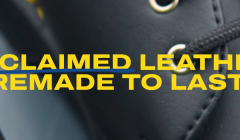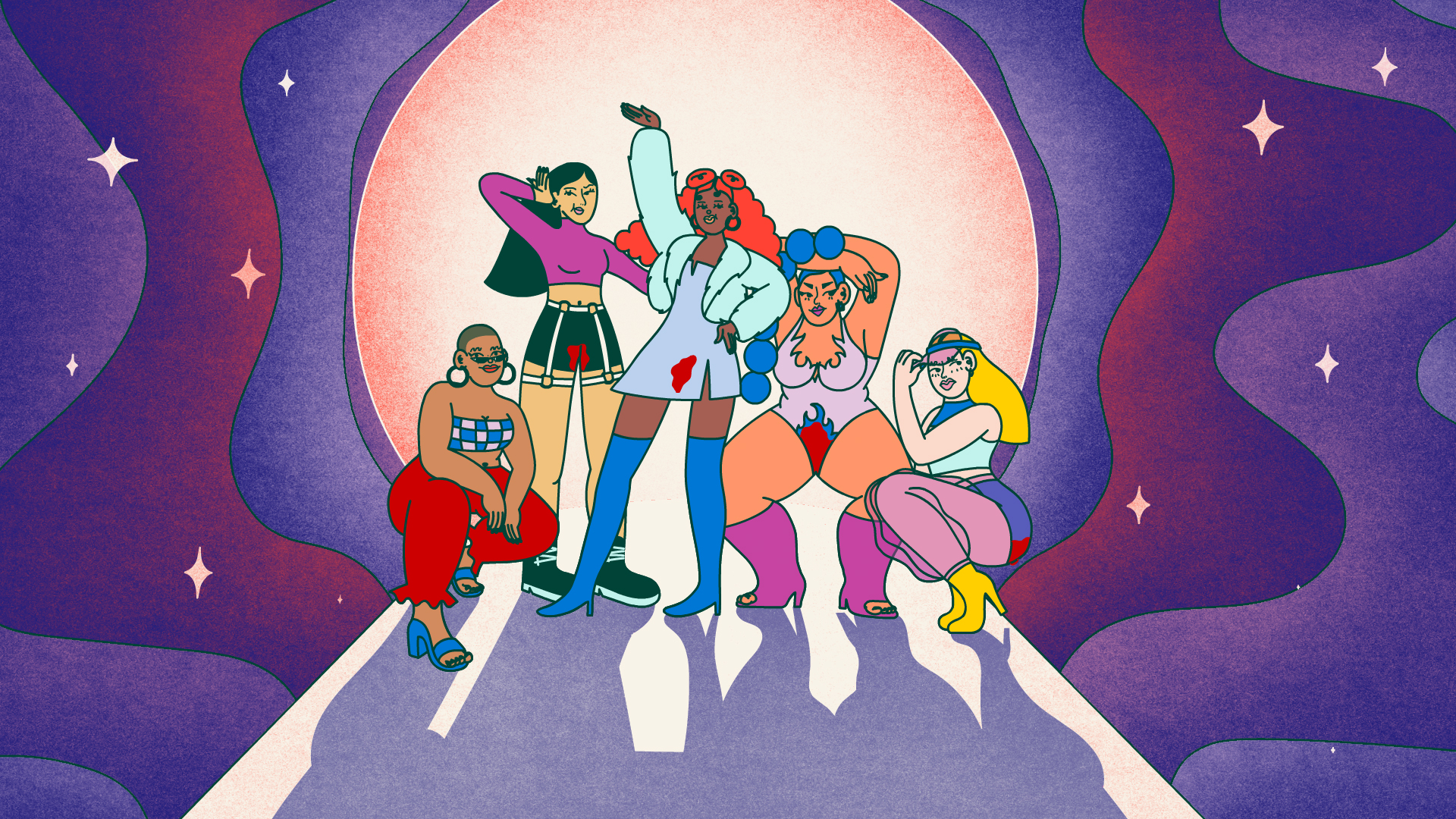
Dr. Martens champions sustainable fashion
Genix Nappa, a new material made of leather offcuts, aims to reduce waste

Why Mother and Bloody Good Period are launching the #NoShameHere campaign.

We’ve come a long way when it comes to periods, or have we? Yes, we have finally seen the back of rollerblading women in white jeans. Yet how many of us are still silently stuffing tampons up our sleeves in the workplace? With almost a quarter of women (25%) having to take time off work because of menstrual health issues, negatively impacting their career progression, there is clearly still a stigma surrounding simply existing in a woman’s body in the workplace. Add to the fact that it wasn’t until January of this year that the ‘luxury item’ of sanitary items had VAT removed and it's all looking like a bloody mess.
Enter Bloody Good Period; the charity believes that no one should be at a disadvantage just because they menstrate. They deliver pads and menstrual supplies to people who need them, give sexual and reproductive health education to those who can’t otherwise access it and fight to eradicate the shame and stigma around periods and menstruation through conversation.
That conversation is being driven today on Menstrual Hygiene Day (28th May) by a new campaign from Bloody Good Period, entitled: #NoShameHere. The film, created by Mother in partnership with Strange Beast, shows the period experiences of a diverse group of people as the entirely natural part of life that they are.
The upbeat and positive film features the CeCe Peniston classic Finally, which has now been re- named Typically, featuring updated lyrics to bring home the lived experiences of having a period.
Gabby Edlin, CEO and Founder of Bloody Good Period, says the organisation has always been bold about periods and never has or will apologise for talking about things that may make people uncomfortable. She explains: “It is the only way things will change for the better. We’re hoping that this campaign will open up conversations and make people question their attitudes to periods.”
The campaign aims to remove shame around both menstruation and menstrual products and kick start conversations to remove period stigma both in the workplace and society at large.
Pretty much anyone who menstruates faces that same squeamishness and awkwardness directed towards them because we live in a world that values the cisgender white man above all.
Gabby Edlin, CEO and Founder of Bloody Good Period
The amorphous blue liquid that was historically used in TV advertising in place of period blood may be a relic of a bygone age; but how far have we still to go when it comes to changing behaviour and tackling the squeamishness that still surrounds the human body?
“Pretty much anyone who menstruates faces that same squeamishness and awkwardness directed towards them because we live in a world that values the cisgender white man above all.” explains Edlin.
She continues: “It’s brilliant that ads are no longer putting just cis women doing ‘aspirational activities’, in a-typical period clothing, but that is just one part of the change we need. This video explores many of the parts of a period that we tend to ignore, the ones that might make you feel less good about yourself - like sweating and cramps, but also the fact that you might want to get on with life, or you might feel sexy on your period.”
According to Edlin, rather than stereotyping how women should feel, in fact any reaction to your period is normal. She says: “It’s only by normalising periods that we’ll remind people that they are an essential part of human life. Periods shouldn’t be a shameful issue to be hidden and the degree to which they’ve been stigmatised by society is tragic for everyone, particularly those experiencing period poverty.”
For a geriatic Millennial, (such as the author of this article, who also attended a school with a ‘special toilet’ for girls who had periods, yes, that really existed) hiding a tampon up a shirt sleeve is a normalised behaviour. Yet not for much longer; as a generational shift is afoot. As Edlin explains: “Young people are starting to talk a lot more openly about periods, which is great. People have been campaigning about axing the tampon tax since the 60s and 70s and that campaign has only just been won. But it makes me so happy to know that the younger generation is reigniting period activism.”
“They’re sick to death of being made to feel terrible for menstruating, so we still have a long way to go, and adults need to help in that journey,” she continues: Noting: “Society shouldn’t construct a veil of secrecy and shame around them.”
It is a shift which has significant implications for the workplace. As Edlin explains sadly, stuffing period products up sleeves is still common in the workplace. A fact that she attributes to ‘other people’s discomfort’ about a natural biological function. “Everyone needs to get over that and just accept periods happen,” she adds.
Many workplaces still can’t handle people menstruating, which is a sorry state.
Gabby Edlin, CEO and Founder of Bloody Good Period
At a time when progressive employers are grasping the reset moment of the pandemic to create more empathetic policies, removing the stigma around periods in the workplace has a legitimate place on the business agenda.
However, Edlin notes things aren’t shifting as fast as they could in the workplace,which is why the group started a dedicated initiative: Bloody Good Employers. “Many workplaces still can’t handle people menstruating, which is a sorry state. We’re hoping that our work will accelerate this shift, and we get a lot of hope when we look towards the vast strides that LGBTQI+ and mental health issues have made in workplace environments,” she explains,
Simultaneously, the Bloody Good Period is also seeking to tackle period poverty; a lack of access to sanitary products which has been exacerbated by the pandemic. As Edlin explains:”When someone is living in poverty, period products are difficult to afford. And with that, the effects of not having them are amplified.”
She believes that it is vital to single this issue out, as it has a lot more stigma and shame. “It can be hard enough being in the situation where you have to go to a food bank and so having to ask for period products can be an extra barrier; it’s a difficult conversation for most. The lack of products can limit lives. Limiting self-esteem worrying about the next tampon. Not wanting to leave the house for fear of leaking. Even the infection risk of leaving products in too long by trying to economise,” she says.
For asylum seekers, Edlin believes that their period can be the straw that breaks the camel’s back when this stress is added to their already lengthy list of worries. “It can be debilitating,” she says. For such a universal experience to be so routinely overlooked, stigmatised and dehumanised is surely destined for change.
The truth about period anxiety
Research from Bloody Good Period reveals why it's critical to break the silence and stigma which still surrounds periods.
9 in 10 of those who menstruate experience period anxiety at work.
63% want employers to normalise talking about periods in the workplace.
Hiding period products is considered ‘the norm’ – 97% of respondents in a social media poll agreed.
25% have experienced a time where they have had to take time off due to menstrual health issues, and it has impacted their career progression.
When asked what employers could do to support them when it comes to their menstrual health, 56% said to encourage and support time off for necessary health checks e.g. cervical smears.
The pandemic has worsened the problem of access and affordability: Bloody Good Period is now meeting a level of demand six times higher than pre-Covid, with over 81,000 packs of products distributed since the start of UK lockdown.
With demand for BGP’s services still growing, the charity is also asking people to donate to enable them to continue distributing products. Visit https://www.bloodygoodperiod.com to find out more.

Looks like you need to create a Creativebrief account to perform this action.
Create account Sign inLooks like you need to create a Creativebrief account to perform this action.
Create account Sign in